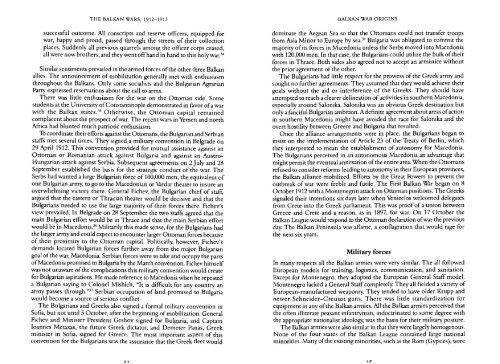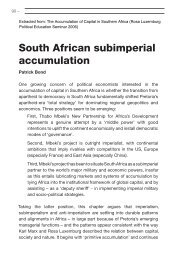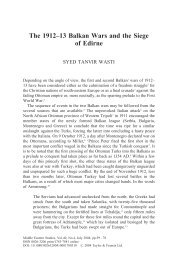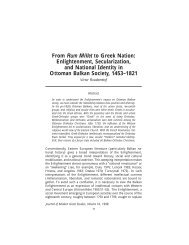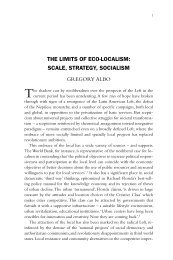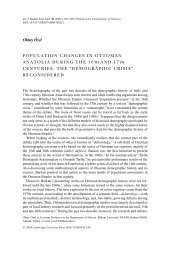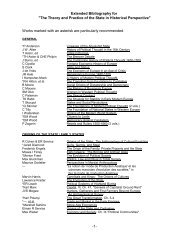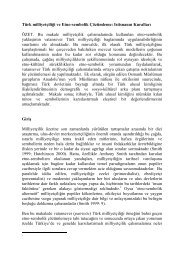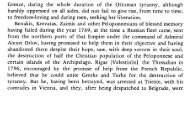Hall, The Balkan Wars
Hall, The Balkan Wars
Hall, The Balkan Wars
Create successful ePaper yourself
Turn your PDF publications into a flip-book with our unique Google optimized e-Paper software.
THE BALKAN WARS, 1912-1913successful outcome. All conscripts and reserve officers, equipped forwar, happy and proud, passed through the streets of their collectionplaces. Suddenly all previous quarrels among the off~cer corps ceased,all were now brothers, and they went off hand in hand to this holy war.34Similar sentiments prevailed in the armed forces ofthe other three <strong>Balkan</strong>allies. <strong>The</strong> announcement of mobilization generally met with enthusiasmthroughout the <strong>Balkan</strong>s. Only some socialists and the Bulgarian AgrarianParty expressed reservations about the call to arms.<strong>The</strong>re was little enthusiasm for the war on the Ottoman side. Somestudents at the University of Constantinople demonstrated in favor of a warwith the <strong>Balkan</strong> states." Otherwise, the Ottoman capital remainedcomplacent about the prospect ofwar. <strong>The</strong> recent wars in Yemen and northAfrica had blunted much patriotic enthusiasm.To coordinate their efforts against the Ottomans, the Bulgarian and Serbianstaffs met several times. <strong>The</strong>y signed a military convention in Belgrade on29 April 1912. This convention provided for mutual assistance against anOttoman or Romanian attack against Bulgaria and against an Austro-Hungarian attack against Serbia. Subsequent agreements on 2 July and 28September established the basis for the strategic conduct of the war. <strong>The</strong>Serbs had wanted a large Bulgarian force of 100,000 men, the equivalent ofone Bulgarian army, to go to the Macedonian or Vardar theater to insure anoverwhelming victory there. General Fichev, the Bulgarian chief of staff;argued that the eastern or Thracian theater would be decisive and that theBulgarians needed to use the large majority of their forces there. Fichev'sview prevailed. In Belgrade on 28 September the two staffs agreed that themain Bulgarian effort would be in Thrace and that the main Serbian effortwould be in Maced~nia.~WiIitarily this made sense, for the Bulgarians hadthe larger army and could expect to encounter larger Ottoman forces becauseof their proximity to the Ottoman capital. Politically, however, Fichev'sdemands located Bulgarian forces further away from the major Bulgariangoal of the war, Macedonia. Serbian forces were to take and occupy the partsof Macedonia promised to Bulgaria by the March convention. Fichev himselfwas not unaware of the complications this military convention would createfor Bulgarian aspirations. He made reference to Macedonia when he repeateda Bulgarian saying to Colonel Mishich, "It is dificult for any country anarmy passes through."" Serbian occupation of land promised to Bulgariawould become a source of serious conflict.<strong>The</strong> Bulgarians and Greeks also signed a formal military convention inSofia, but not until 5 October, after the beginning of mobilization. GeneralFichev and Minister President Geshov signed for Bulgaria, and CaptainIoannes Metaxas, the future Greek dictator, and Demeter Panas, Greekminister in Sofia, signed for Greece. <strong>The</strong> most important aspect of thisconvention for the Bulgarians was the assurance that the Greek fleet wouldBALKAN WAR ORIGINSdominate the Aegean Sea so that the Ottomans could not transfer troopsfrom Asia Minor to Europe by sea.3H Bulgaria was obligated to commit themajority of its forces in Macedonia unless the Serbs moved into Macedoniawith 120,000 men. In that case, the Bulgarians could utilize the bulk of theirforces in Thrace. Both sides also agreed not to accept an armistice withoutthe prior agreement of the other.<strong>The</strong> Bulgarians had little respect for the prowess of the Greek army andsought no further agreements. <strong>The</strong>y assumed that they would achieve theirgoals without the aid or interference of the Greeks. <strong>The</strong>y should haveattempted to reach a clearer delineation of activities in southern Macedonia,especially around Salonika. Salonika was an obvious Greek destination butonly a fanciful Bulgarian ambition. Adefinite agreement about areas of actionin southern Macedonia might have avoided the race for Salonika and theovert hostility between Greece and Bulgaria that resulted.Once the alliance arrangements were in place, the Bulgarians began toinsist on the implementation of Article 23 of the Treaty of Berlin, whichthey interpreted to mean the establishment of autonomy for Macedonia.<strong>The</strong> Bulgarians perceived in an autonomous Macedonia an advantage thatmight permit the eventual annexation of the entire area. When the Ottomansrefused to consider reforms leading to autonomy in their European provinces,the <strong>Balkan</strong> alliance mobilized. Efforts by the Great Powers to prevent theoutbreak of war were feeble and futile. <strong>The</strong> First <strong>Balkan</strong> War began on 8October 1912 with a Montenegrin attack on Ottoman positions. <strong>The</strong> Greekssignaled their intentions six days later when Venizelos welcomed delegatesfrom Crete into the Greek parliament. This was proof of a union betweenGreece and Crete and a reason, as in 1897, for war. On 17 October the<strong>Balkan</strong> League would respond to the Ottoman declaration ofwar the previousday. <strong>The</strong> <strong>Balkan</strong> Peninsula was aflame, a conflagration that would rage forthe next six years.Military forcesIn many respects all the <strong>Balkan</strong> armies were very similar. <strong>The</strong> all followedEuropean models for training, logistics, communication, and sanitation.Except for Montenegro, they adopted the European General Staff model.Montenegro lacked a General Staff completely. <strong>The</strong>y all fielded a variety ofEuropean-manufactured weaponry. <strong>The</strong>y tended to have older Krupp andnewer Schneider-Creusot guns. <strong>The</strong>re was little standardization forequipment in any of the <strong>Balkan</strong> armies. All the <strong>Balkan</strong> armies perceived thatthe often illiterate peasant infantryman, indoctrinated to some degree withthe appropriate nationalist ideology, was the basis for their military posture.<strong>The</strong> <strong>Balkan</strong> armies were also similar in that they were largely homogenous.None of the four states of the <strong>Balkan</strong> League contained large nationalminorities. Many ofthe existing minorities, such as the Rom (Gypsies), were


